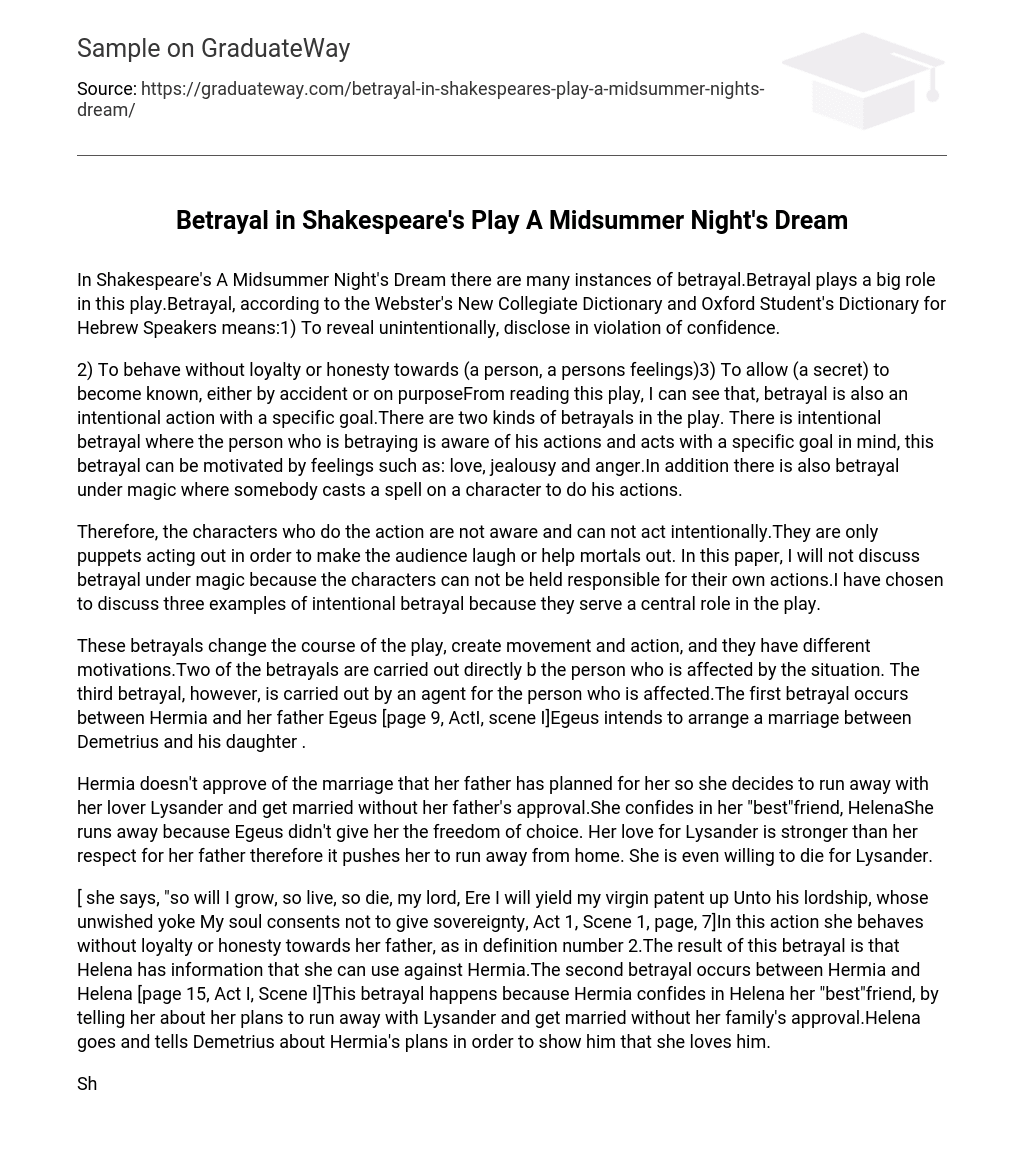In Shakespeare’s A Midsummer Night’s Dream there are many instances of betrayal.Betrayal plays a big role in this play.Betrayal, according to the Webster’s New Collegiate Dictionary and Oxford Student’s Dictionary for Hebrew Speakers means:1) To reveal unintentionally, disclose in violation of confidence.
2) To behave without loyalty or honesty towards (a person, a persons feelings)3) To allow (a secret) to become known, either by accident or on purposeFrom reading this play, I can see that, betrayal is also an intentional action with a specific goal.There are two kinds of betrayals in the play. There is intentional betrayal where the person who is betraying is aware of his actions and acts with a specific goal in mind, this betrayal can be motivated by feelings such as: love, jealousy and anger.In addition there is also betrayal under magic where somebody casts a spell on a character to do his actions.
Therefore, the characters who do the action are not aware and can not act intentionally.They are only puppets acting out in order to make the audience laugh or help mortals out. In this paper, I will not discuss betrayal under magic because the characters can not be held responsible for their own actions.I have chosen to discuss three examples of intentional betrayal because they serve a central role in the play.
These betrayals change the course of the play, create movement and action, and they have different motivations.Two of the betrayals are carried out directly b the person who is affected by the situation. The third betrayal, however, is carried out by an agent for the person who is affected.The first betrayal occurs between Hermia and her father Egeus [page 9, ActI, scene I]Egeus intends to arrange a marriage between Demetrius and his daughter .
Hermia doesn’t approve of the marriage that her father has planned for her so she decides to run away with her lover Lysander and get married without her father’s approval.She confides in her “best”friend, HelenaShe runs away because Egeus didn’t give her the freedom of choice. Her love for Lysander is stronger than her respect for her father therefore it pushes her to run away from home. She is even willing to die for Lysander.
[ she says, “so will I grow, so live, so die, my lord, Ere I will yield my virgin patent up Unto his lordship, whose unwished yoke My soul consents not to give sovereignty, Act 1, Scene 1, page, 7]In this action she behaves without loyalty or honesty towards her father, as in definition number 2.The result of this betrayal is that Helena has information that she can use against Hermia.The second betrayal occurs between Hermia and Helena [page 15, Act I, Scene I]This betrayal happens because Hermia confides in Helena her “best”friend, by telling her about her plans to run away with Lysander and get married without her family’s approval.Helena goes and tells Demetrius about Hermia’s plans in order to show him that she loves him.
She believes that if she tells him about Hermia, he will fall in love with her. Helena’s motivation in this betrayal is jealousy of Hermia and desire to win Demetrius back. [she says” I will go tell him of fair Hermia’s flight: Then to the wood will he, tomorrow night, pursue her; and for this intelligence, if I have thanks it is a dear expense; But herein I to enrich my pain, to have his sight thither, and back again.” Act1, scene 1, page, 17]In this action she discloses a secret in violation of confidence, as in definitions number 1 and 3.
The result of this betrayal is that Demetrius is on this way to take Hermia back and tell her father about the action that she has done.The third betrayal occurs between Oberon and Titania [page37, Act I, scene I]This betrayal happens because Titania refuses to give Oberon the Indian boy.As a result of this Oberon becomes enraged and calls his assistant Puck Oberon tells him to take a potion and sprinkle it over Titania and make her fall in love with a donkey.[ he says” I’ll watch Tatiana when she is asleep, and drop the liquor of it in her eyes: the next thing then she, waking, looks upon- be it on lion, bear, or wolf , or bull, On meddling monkey, or no busy ape- she shall pursue it with the soul of love.
And ere I take this charm from off her sight (As I can take it with another herb) I’ll make her render up her page to me. But who comes here? I am invisible, and I will overhear their conference. Act 1, scene1, page 39]Through this action, Oberon behaves without Loyalty or honesty towards a person( his wife) or a persons feelings .as in definition number 2.
As a result of this betrayal she falls in love with a donkey.In conclusion, we can see that betrayal plays a big role in this play. It is mostly motivated by love or affection for somebody or jealousy.People get hurt and get into troubles that they didn’t plan or think about.
Yet the people who betray, Do learn from their actions, therefore it could be a good thing because Hermia and Helena actually become better friends as a result of Helena’s betrayal.And Tatiana falls in love with her husband Oberon again as a result of the betrayal. Hermia and Lysander are together because of Hermia’s betrayal of her father’s wishes. By the end of the play, all of the couples are in their place despite the betrayals and they all live happily ever after.





